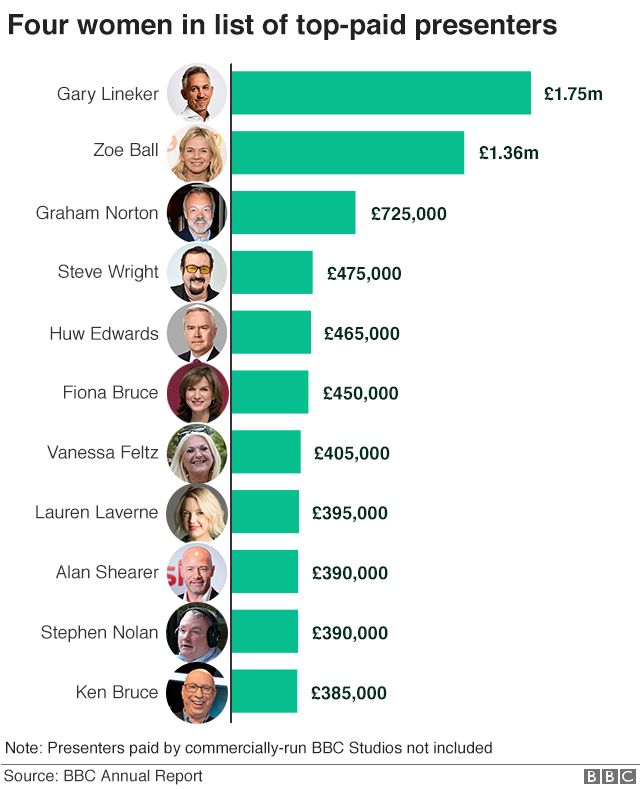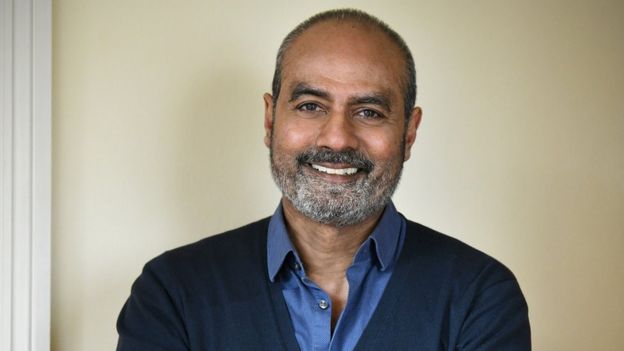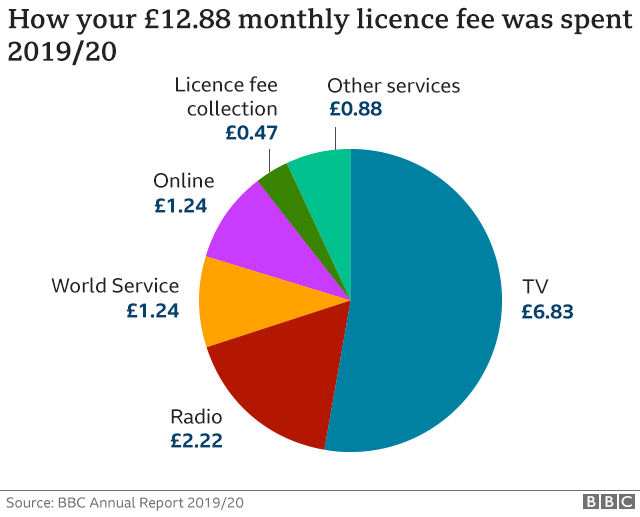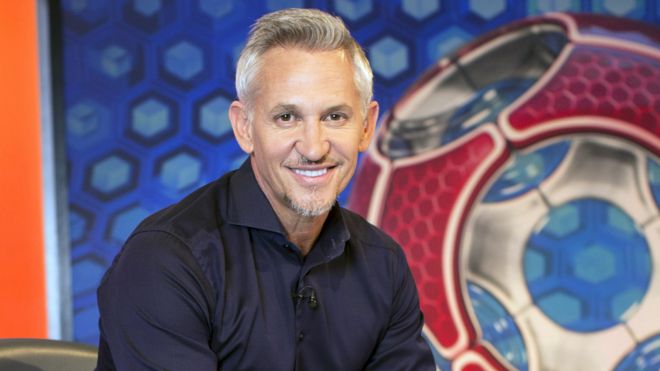The chart shows Lineker as the highest-earning star with an unchanged salary of £1.75m in the last financial year.
But he has since signed a new contract, which will see that fee cut by 23%.
That means he could earn less than Zoe Ball next year. The Radio 2 presenter has seen her pay rise by £1m since taking over the breakfast show in 2019.
Fiona Bruce and Lauren Laverne have also moved into the top 10 of the BBC's highest-paid stars, which features four women for the first time. Vanessa Feltz is also among the top earners, the corporation's annual report shows.

Lineker's new salary will be published on next year's list. Director general Tim Davie told reporters: "Gary Lineker has signed up to a new five-year contract saving a quarter over his last contract."
Mr Davie described the former England player as a brilliant broadcaster and said his new deal was a great example of the "best talent and the best value".
"And before you ask, Gary knows his responsibility to the BBC in terms of his use of social media," Mr Davie added, referring to social media rules for BBC staff and presenters that are expected to be announced soon.
Lineker, a prolific tweeter who frequently discusses his political views online, sent a message to "the haters" on Twitter.
Oh dear. Thoughts are with the haters at this difficult time. https://t.co/r41naocRcI
— Gary Lineker (@GaryLineker) September 15, 2020
Some stars don't appear on the salary list because the BBC's commercial arm, BBC Studios, which makes many popular shows, doesn't have to disclose its fees.
As a result, the stars of some of the BBC's biggest programmes - like Top Gear and Doctor Who - are absent from the list.
Ball's pay has risen despite the fact that her Strictly spin-off show It Takes Two is made by BBC Studios and is not included.

Last year, the top earners included three women - Ball, Claudia Winkleman and Feltz.
Overall, the BBC's total salary bill for on-air talent in 2019/20 rose by £1m to £144.6m, while salaries for the BBC's executive committee rose from £4.95m to £5.41m.
Conservative MP Julian Knight, who chairs the Department for Culture, Media and Sport select committee, said the overall rise in pay for on-air talent was "concerning".
He said: "Despite Gary Lineker's pay cut, when millions of pensioners are having to find extra cash to pay for the BBC and services they depend on, it's concerning to see not only has the bill for on-air talent has grown by more than £1m but that more than 100 senior executives are paid over £150,000 a year - in many cases considerably more than that."
The top-earning presenters are still all white, although Mr Davie said 18% of those making more than £150,000 were from black, Asian and minority ethnic (BAME) backgrounds, up from 12% four years ago.

The report also showed 12.3% of BBC leaders were BAME, below its 15% target for 2020.
The overall gender pay gap at the BBC has fallen from 6.7% to 6.2%. Previous director general Tony Hall had pledged to close the gender pay gap by 2020.
Mr Davie said that "was a very aggressive target," adding: "We can be proud of our progress but we must go further."
He said he wanted to increase the number of women across leadership ranks, where the figure currently stands at 45%, short of the 50% target. "It's about the leaders, not talk but action," he said.
There are "a small number of historic equal pay cases" to be resolved, the report said.

This annual report contains plenty of complex messages, but is likely still to lead to simple and negative headlines for the BBC.
The list of salaries for on-air broadcasters - which includes me - reflects three years of reforms.
As part of those reforms, many broadcasters - particularly but not exclusively men - either took significant pay cuts (Huw Edwards, Jeremy Vine etc) or left the BBC (Chris Evans, John Humphrys leaving Today, Eddie Mair).
Now, several broadcasters - particularly but not exclusively women - have had pay rises.
Crucially, the pay rises for these female broadcasters (Zoe Ball, Fiona Bruce, Lauren Laverne, Emily Maitlis), reflect additional work.
The overall rise in pay for those whose salaries are published - around £1m - is not, in financial terms, huge, given the number of people to which it pertains, and the salaries themselves. Indeed, it is below inflation, and therefore a cut in real terms.
Nevertheless, the optics are bad for the BBC. Complexity doesn't cut through in stories about high pay.
The simple fact is, in a time of immense hardship across the country, with so many people redundant or furloughed and suffering, these huge salaries (and their modest overall increase) will strike many licence fee payers as disgraceful.
The other big story is the BBC's finances. In the medium-term, they are badly strained. It is striking that by the end of next year, the BBC will have delivered around £800m in savings in just five years.
But the fact that the licence fee didn't rise with inflation between 2010 and 2017, and the £125m hit (at least) from the coronavirus pandemic, are a huge injury to the bottom line for the coming year.
And that's before you even consider whether a generation who give so much time to TikTok, YouTube and WhatsApp feel they need to pay for a TV licence.

What else did the BBC annual report say?
Licence fee income dropped by £170m to £3.52bn in 2019/20, partly due to evasion. Overall, the BBC's overall income was down by £119m.
There was growth in commercial income from BBC Studios, and the corporation's chairman Sir David Clementi said a drive to increase such income would be "even more pressing" because there will be "major financial pressures on the BBC" in the coming years.
The coronavirus pandemic means the organisation has faced "significant challenges" and will have to find extra savings on top of those already planned.
The BBC has already saved £618m since 2016/17, and that figure is expected to rise above £800m by the end of the current financial year, the report said.
Latest Stories
-
Ghana Hajj Board confirms death of seven pilgrims in 2025 pilgrimage
3 hours -
Both governments are responsible for contributing to the country’s energy insecurity through financial debt
3 hours -
Israel is accused of the gravest war crimes – how governments respond could haunt them for years to come
4 hours -
Liberia’s ex-speaker charged with arson over parliament fire
5 hours -
Help protect oceans for sustainable future – Dr. Agyekumhene
5 hours -
Portugal vs Spain Nations League final preview
6 hours -
Trump-Musk row fuels ‘biggest crisis ever’ at Nasa
7 hours -
Sir Sam Jonah’s blueprint: 10 keys to transform Ghanaian youth into nation builders
7 hours -
Sir Sam Jonah calls for urgent STEM prioritisation to develop Ghana
7 hours -
Gyakie makes Forbes Africa’s 30 Under 30 list for 2025
8 hours -
7 Ghanaian pilgrims confirmed dead during 2025 Hajj
8 hours -
‘Write for World’ graduates 30 females in entrepreneurship and fashion design programme
10 hours -
Police escort vehicle somersaults in near-fatal crash near Binduri
10 hours -
Sir Sam Jonah commends Mahama as he backs youth leadership to transform Ghana
10 hours -
OSP vs Ofori-Atta: It is difficult to reconcile the letters from Mayo Clinic – Neurosurgeon
11 hours

